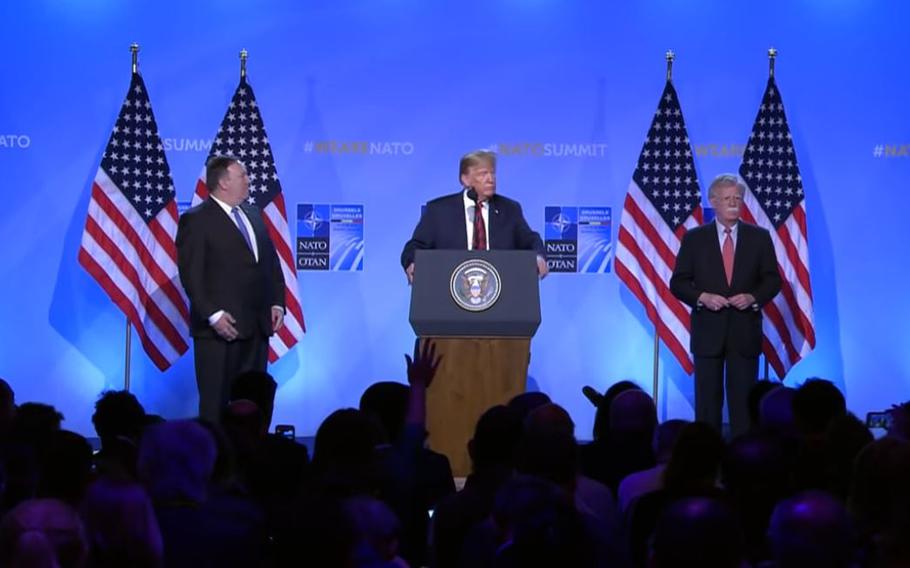U.S.
Trump says he threatened not to defend NATO members from Russia
The Washington Post April 22, 2022

A video screen grab shows then-President Donald Trump speaking from Brussels on July 12, 2018, about getting other NATO members to pay more to fund NATO. At left, is then-Secretary of State Mike Pompeo and at right, then-National Security Adviser John Bolton. (The Washington Post)
Former president Donald Trump on Thursday offered his most explicit statement to date that he threatened not to defend NATO allies from attacks by Russia.
Appearing at an event held by the Heritage Foundation in Florida, Trump claimed that he told fellow NATO leaders that he might not abide by NATO's Article 5 collective-defense clause if those countries didn't pay more for the alliance.
"[A fellow leader] said, 'Does that mean that you won't protect us in case - if we don't pay, you won't protect us from Russia' - was the Soviet Union, but now Russia," Trump said. "I said, 'That's exactly what it means.' "
Trump implied that it was a negotiating tactic. "Now if I said, 'No, I don't mean that,' then why would they pay? So somebody had to say it," he said.
Trump said he was "amazed" the conversation hadn't leaked during his presidency.
The comments - an apparent reference to NATO's 2018 summit in Brussels, which Trump shook up with his threats - were the most extensive account from Trump himself about his mind-set and intentions at the time. They don't fully jibe with how others described the conversations at the time, although they may still be an accurate window how he felt.
Leaders and others who were inside the room at that summit said that Trump's threats to them were actually less explicit than the former president recounted in his Thursday speech. Trump said that if countries did not live up to their spending targets by the end of 2018, he would "do his own thing," according to interviews in the hours after the meeting with two officials familiar with the conversation
Policymakers had different interpretations of what he meant. Some felt he was threatening to pull out of NATO altogether. Others believed he might be saying he would make decisions about whether to defend countries based on whether they were meeting their spending commitments
Trump's national security adviser at the time, John Bolton, has said that he was worried the president would pull out of the alliance during the summit, a fear recounted in his memoir and in an interview with The Washington Post last month.
Bolton said last month that he "had my heart in my throat at that NATO meeting."
"I didn't know what the president would do," Bolton said. "He called me up to his seat seconds before he gave the speech. And I said, look, go right up to the line, but don't go over it. I sat back down. I had no idea what he'd do."
Trump has previously danced around whether he would commit to Article 5, including conspicuously declining to endorse it in May 2017. The following month, he did endorse it. But by the summer of 2018, he was again calling that into question, suggesting it might not be worthwhile for NATO countries to commit to defending "tiny" Montenegro, which was at the time a new member.
Trump has regularly tried to claim credit for making NATO countries pay more, though the reality is more complex. NATO countries were already increasing their funding substantially before Trump's presidency, following Russia's annexation of Crimea from Ukraine in 2014. The guidelines state that each should spend 2 percent of their gross domestic product on defense by 2024.
Trump's comments come as NATO appears set to potentially expand its alliance in response to Russia's invasion of Ukraine; both Sweden and Finland have indicated they will look at joining in the months to come. It also comes as neighboring NATO counties worry about the conflict crossing into their territory and, domestically, as U.S. lawmakers have rallied around NATO - though recently 63 House Republicans voted against a symbolic resolution reaffirming support for the alliance, for a variety of reasons.
Article 5 has only been invoked once in NATO's history: the day after the Sept. 11, 2001, terrorist attacks in the United States.